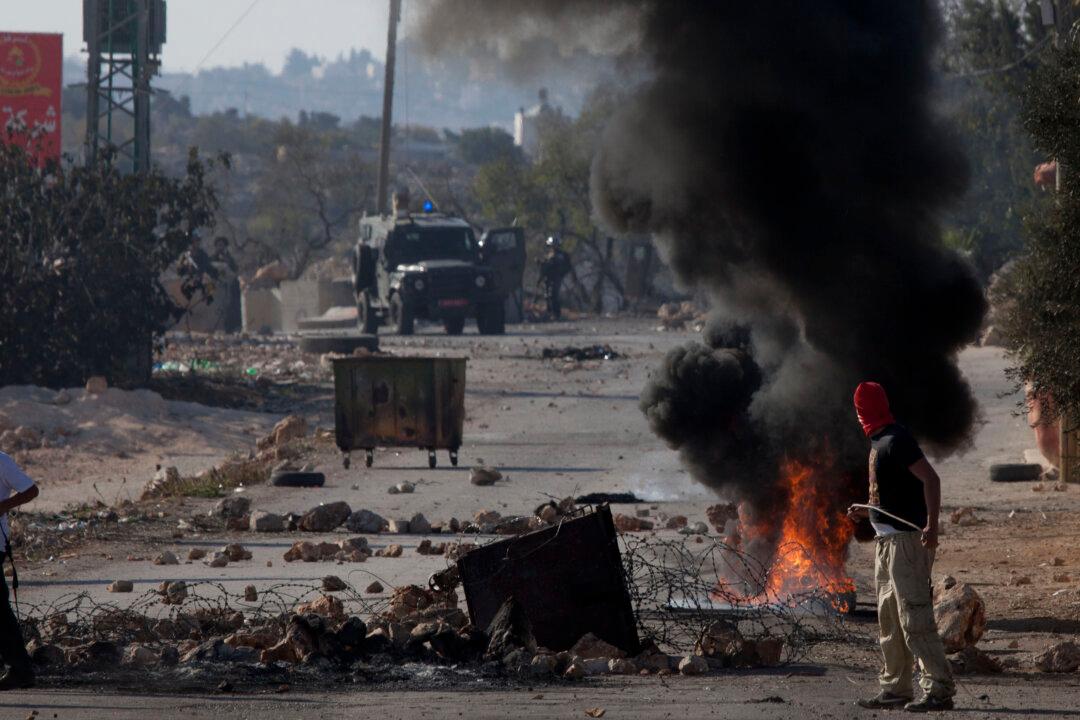JERUSALEM—Clashes erupted Sunday between Palestinian youths and Israeli forces at theWest Bank funeral of a teenage boy killed by Israeli troops, as an Ecuadorean tourist died of wounds suffered in an attack last week by a Palestinian man who drove his car into a crowded Jerusalem train station.
With tensions rising in the area, Prime Minister Benjamin Netanyahu said Israel was beefing up security patrols in Jerusalem with 1,000 extra officers and special forces. The city’s eastern sector has experienced months of unrest, including near nightly clashes between police and Palestinianyouths and last week’s deadly attack at the station.
The 22-year-old Ecuadorean, confirmed by police and hospital officials, became the second person to die from Wednesday’s attack. Her name was not immediately released. A 3-month-old Israeli-American baby girl, Chaya Zissel Braun, was also killed.
Police said the driver, a Palestinian man from east Jerusalem, had a history of anti-Israel violence and had previously spent time in Israeli prison. The man was shot as he tried to flee the scene and later died of his wounds.
In the West Bank, thousands of people attended the funeral of 14-year-old Orwah Hammad, a U.S.-born Palestinian who was killed in a clash with Israeli troops last week. Relatives have said Hammad was among a group of youths throwing stones at soldiers. The Israeli army has said it fired to prevent the hurling of a firebomb.
A large crowd carried the boy’s body, wrapped in a black and white headscarf and green flag, on a stretcher, in the village of Silwad, near Ramallah. Elsewhere in town, groups of youths hurled rocks at Israeli troops, who responded with tear gas.
Hammad, who was born in New Orleans and came to the West Bank with his family when he was 6, was the second Palestinian teen to die in clashes with Israeli troops in the past week.
The West Bank bloodshed has added to the tensions caused by months of unrest in east Jerusalem. Addressing his Cabinet, Netanyahu said Israel was increasing security in the city to restore order.
“We will not allow the reality in the city to become such that people lob stones, throw firebombs and disturb public order,” Netanyahu said at the start of his weekly Cabinet meeting.
In recent weeks, Palestinian youths have clashed frequently with Israeli police, thrown stones and firebombs at Israeli motorists and disrupted service of the city’s light rail train.
The violence on Sunday prompted officials in Tel Aviv to postpone school trips to Jerusalem this week. The municipality of Tel Aviv, Israel’s commercial and cultural capital, said it made the decision in response to requests from 8th-grade parents because the planned trip included visits to areas affected by the violence.
In a statement, the Jerusalem municipality said Jerusalem is “a safe and open city” and canceling trips would “reward those who are disturbing the peace.”
The funeral of the driver of the car that smashed into the train station last week was planned for Sunday night. Police had requested a small ceremony to prevent rioting, police spokeswoman Luba Samri said. After an Israeli court ruled that only 20 people could attend, the driver’s family initially refused to accept his body and the funeral was threatened with postponement. But the family eventually relented and accepted the body, and the funeral was expected to proceed late Sunday evening, Israeli police said.
Also Sunday, Israel announced it would require Palestinian laborers working in Israel to return to their homes in the West Bank only through specific military checkpoints, a regulation thatPalestinian rights groups said is designed to prevent the laborers from taking public buses with Israeli settlers.
Ofer Harel, a spokesman for Israeli Defense Minister Moshe Yaalon, said the new regulation was aimed at strengthening oversight on the laborers and preventing militant attacks.
Palestinians with Israeli work permits may continue to travel on Israeli buses, Harel said. But Palestinian rights groups say buses serving Israelis do not cross the checkpoints that Palestinians will be required to cross on their way back.
From The Associated Press
